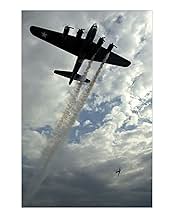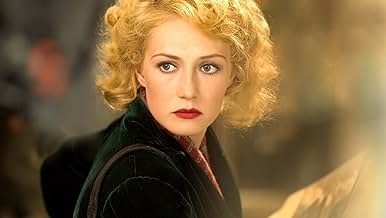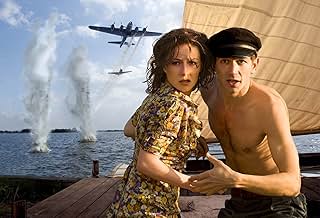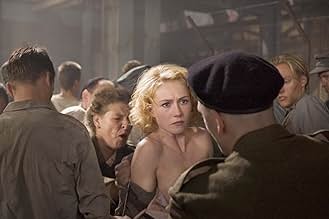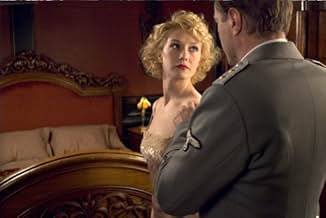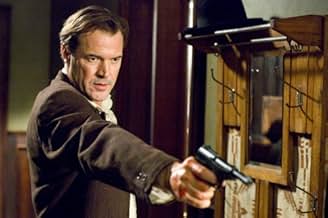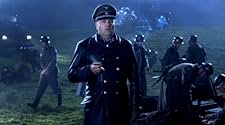Nei Paesi Bassi occupati dai nazisti durante la seconda guerra mondiale, una cantante ebrea si infiltra nel quartier generale della Gestapo per collaborare con la resistenza olandese.Nei Paesi Bassi occupati dai nazisti durante la seconda guerra mondiale, una cantante ebrea si infiltra nel quartier generale della Gestapo per collaborare con la resistenza olandese.Nei Paesi Bassi occupati dai nazisti durante la seconda guerra mondiale, una cantante ebrea si infiltra nel quartier generale della Gestapo per collaborare con la resistenza olandese.
- Regia
- Sceneggiatura
- Star
- Nominato ai 1 BAFTA Award
- 13 vittorie e 23 candidature totali
Recensioni in evidenza
A really interesting mix of American movie - driven by a strong narrative, complete with car chases and tense thriller moments - and European film - multilingual, with strong sense of historical moment and complex characterisation. The lead performance by Carice van Houten is compelling and charismatic. Overall the film does not amount to a big emotional experience - the centre of the emotion, however, is subtle and focused on the scenes of Ellis (the Jewish heroine, undercover among the Nazis) and Muntze (the German officer) in bed together. A complex and believable love develops between them which is the heart of the film. Great to see Verhoeven back in Europe on a project of passion, bringing back some American know-how to a fairly large scale film, albeit for a pretty modest budget (c$20M I believe).
Who said that they don't make films like they used to? A couple of weeks ago, I declared that "The Departed" was the best film of 2006. Last week, I replaced the Scorsese epic with Sofia Coppola's luscious biopic of "Marie Antoinette". I never would have guessed that Paul Verhoeven (Yes, the Paul Verhoeven who directed "Total Recall", "Basic Instinct" & "Showgirls"!!!) would challenge them both with a gripping, edge-of-your-seat World War II yarn.
I use the old-fashioned term, yarn, because "Black Book" is very much a film that feels like it was made decades ago. The lush visuals, orchestral music, European styling, wartime romanticism and cliffhanging chapters all add a certain 1950's charm to the white-knuckle plot. One gets the feeling that the ghosts of Gregory Peck, Hedy Lamarr, Ava Gardner, Spencer Tracy & Jean Harlow are embodying the cast of this classic espionage drama.
The film begins in 1956 with Rachel Steinn, a school teacher at an Israeli kibbutz, being accidentally found by an old acquaintance, who is on vacation with her husband. The meeting brings back painful wartime memories and Rachel heads to a quiet place by the river to recollect our central story.
So back we travel, to occupied Holland, circa 1944, and we see a more youthful Rachel, diligently practicing a bible passage in order to earn a meal from the family who is hiding her from the Germans. She, like many Jews at that time, were surviving by any means necessary in order to outlast the Nazi tyranny. However, one day, while flirting with a young man sailing on the nearby lake, her safe zone is destroyed in one fell swoop by a low flying bomber. Rachel is immediately on the run, aided by her new sailor friend.
So much of this film relies on surprises and shocking twists that it would be unfair of me to detail too many plot threads. And my goodness, there are a tons of them. This is truly a definitive epic, in every cinematic sense of the word. Rachel is crossed and doubled-crossed and triple-crossed, eventually winding up as a member of the famed Resistance. Via cunning and fortunate circumstance, she manages to transform herself into Ellis de Vries, a blond bombshell who infiltrates the German command in the area. She uses a quick wit, a gorgeous voice, some feminine charms and a collection of Queen Wilhelmina stamps to crawl her way into the arms of Herr Müntze (Sebastian Koch).
From deep within the Nazi camp, she is able to strategically plant a microphone and to use tidbits of acquired knowledge in order to provide the Resistance with vital information and plans. While evolving into a brave spy, she must learn how to reconcile her own personal vendettas and her surprising romantic feelings for Müntze.
There are no more exciting themes for me in movies than tragic romance, espionage and escape. I have loved them all with a passion ever since I was a small child. Throw in a magnificent screenplay, marvelous cinematography, a plot that churns along with the efficiency of a Swiss watch, and the added bonus of a gorgeous actress -- the result is sure to be a huge winner for me. "Black Book" satisfies everything that I truly want from a film. It is the reason I go to the movies. I was utterly swept away by the intrigue, drama, romance and tragedy. This emotionally weighty film even manages to deliver a few wonderfully witty moments to break the supreme tension of it all.
The cast is immense. Every one of them exudes authenticity. It is one of the best ensembles of the year. However, I struggle to call it an ensemble because it would be ignoring one of the singular performances in recent memory. Carice Van Houten is not a household name to most. She is a Dutch beauty who, if this role is anything to go by, is on the verge of a magnificent career. Her grasp on the emotional turmoil of Rachel/Ellis is of profound proportions. It is a stunning turn that flatly demands award consideration. The range on display in this movie is astonishing. Rarely have I ever been as moved by a character's heroism and charm and guile and wits. She is able to create a sympathetic creature... one that we will root for until the end... one that we trust and believe in.
I cannot leave this review without admitting to my utter admiration for Paul Verhoeven, a director whose films I have often enjoyed and panned in equal measures. This is the work of his lifetime. It is the film he should list above all others on his résumé. This is a thoughtful, poignant and tremendously thrilling adventure. For attentive viewers, the final scenes of the film act as a provocative meditation on the relationships between war and justice, peace and insularity, the actions of the past and the promises of the future. "Black Book (Zwartboek)" is not only a riveting WWII adventure, but a superb contrast of morality -vs- reality.
TC Candler IndependentCritics.com
I use the old-fashioned term, yarn, because "Black Book" is very much a film that feels like it was made decades ago. The lush visuals, orchestral music, European styling, wartime romanticism and cliffhanging chapters all add a certain 1950's charm to the white-knuckle plot. One gets the feeling that the ghosts of Gregory Peck, Hedy Lamarr, Ava Gardner, Spencer Tracy & Jean Harlow are embodying the cast of this classic espionage drama.
The film begins in 1956 with Rachel Steinn, a school teacher at an Israeli kibbutz, being accidentally found by an old acquaintance, who is on vacation with her husband. The meeting brings back painful wartime memories and Rachel heads to a quiet place by the river to recollect our central story.
So back we travel, to occupied Holland, circa 1944, and we see a more youthful Rachel, diligently practicing a bible passage in order to earn a meal from the family who is hiding her from the Germans. She, like many Jews at that time, were surviving by any means necessary in order to outlast the Nazi tyranny. However, one day, while flirting with a young man sailing on the nearby lake, her safe zone is destroyed in one fell swoop by a low flying bomber. Rachel is immediately on the run, aided by her new sailor friend.
So much of this film relies on surprises and shocking twists that it would be unfair of me to detail too many plot threads. And my goodness, there are a tons of them. This is truly a definitive epic, in every cinematic sense of the word. Rachel is crossed and doubled-crossed and triple-crossed, eventually winding up as a member of the famed Resistance. Via cunning and fortunate circumstance, she manages to transform herself into Ellis de Vries, a blond bombshell who infiltrates the German command in the area. She uses a quick wit, a gorgeous voice, some feminine charms and a collection of Queen Wilhelmina stamps to crawl her way into the arms of Herr Müntze (Sebastian Koch).
From deep within the Nazi camp, she is able to strategically plant a microphone and to use tidbits of acquired knowledge in order to provide the Resistance with vital information and plans. While evolving into a brave spy, she must learn how to reconcile her own personal vendettas and her surprising romantic feelings for Müntze.
There are no more exciting themes for me in movies than tragic romance, espionage and escape. I have loved them all with a passion ever since I was a small child. Throw in a magnificent screenplay, marvelous cinematography, a plot that churns along with the efficiency of a Swiss watch, and the added bonus of a gorgeous actress -- the result is sure to be a huge winner for me. "Black Book" satisfies everything that I truly want from a film. It is the reason I go to the movies. I was utterly swept away by the intrigue, drama, romance and tragedy. This emotionally weighty film even manages to deliver a few wonderfully witty moments to break the supreme tension of it all.
The cast is immense. Every one of them exudes authenticity. It is one of the best ensembles of the year. However, I struggle to call it an ensemble because it would be ignoring one of the singular performances in recent memory. Carice Van Houten is not a household name to most. She is a Dutch beauty who, if this role is anything to go by, is on the verge of a magnificent career. Her grasp on the emotional turmoil of Rachel/Ellis is of profound proportions. It is a stunning turn that flatly demands award consideration. The range on display in this movie is astonishing. Rarely have I ever been as moved by a character's heroism and charm and guile and wits. She is able to create a sympathetic creature... one that we will root for until the end... one that we trust and believe in.
I cannot leave this review without admitting to my utter admiration for Paul Verhoeven, a director whose films I have often enjoyed and panned in equal measures. This is the work of his lifetime. It is the film he should list above all others on his résumé. This is a thoughtful, poignant and tremendously thrilling adventure. For attentive viewers, the final scenes of the film act as a provocative meditation on the relationships between war and justice, peace and insularity, the actions of the past and the promises of the future. "Black Book (Zwartboek)" is not only a riveting WWII adventure, but a superb contrast of morality -vs- reality.
TC Candler IndependentCritics.com
It took me about an hour after having seen the film to find any enthusiasm to write this review. The film Black Book, or Zwartboek in Dutch, is very impressive, with an excellent feeling for the complexity of inter-human relationships.
The story is about a Jewish girl that finds herself in a powerless situation in a war that tends to bring out the worst in all, 'good' or 'bad'. So much for what we know without seeing the film for ourselves. The film starts out rather typical, informing us with what we already new about the war: people where poor, hungry and trying to survive. However, the second part of the film shows a less well known part of Dutch resistance history: that the war brings out the worst in everybody. Without losing sight of the importance of the resistance against the foreign repression, Paul Verhoeven confuses his audience by visualizing how ones own well-being seems to go at the cost of the well-being of another. No black and white, no bad or good, but only the individual choice, that is tormented by the will to survive and a feeling for morality.
The film is daring for showing the dark side of the Dutch national history. However, the most valuable of the film is that it captivates its audience and sensitizes its audience for the misery of the historical event of World War II, but also the contemporary difficulties that affects human beings rather than countries. A must see, even though it makes you feel miserable.
The story is about a Jewish girl that finds herself in a powerless situation in a war that tends to bring out the worst in all, 'good' or 'bad'. So much for what we know without seeing the film for ourselves. The film starts out rather typical, informing us with what we already new about the war: people where poor, hungry and trying to survive. However, the second part of the film shows a less well known part of Dutch resistance history: that the war brings out the worst in everybody. Without losing sight of the importance of the resistance against the foreign repression, Paul Verhoeven confuses his audience by visualizing how ones own well-being seems to go at the cost of the well-being of another. No black and white, no bad or good, but only the individual choice, that is tormented by the will to survive and a feeling for morality.
The film is daring for showing the dark side of the Dutch national history. However, the most valuable of the film is that it captivates its audience and sensitizes its audience for the misery of the historical event of World War II, but also the contemporary difficulties that affects human beings rather than countries. A must see, even though it makes you feel miserable.
I seem to be the first in the US to comment on this film after having seen it at a regular theater.
There's no sense in talking about the movie's plot as so many others have already done so.
My fiancée is German and tends to be interested in those artsy foreign films. Tonight she decided we should go see this one. I'm glad we did.
I've seen a number of Paul Verhoeven's films and have found some of them quite entertaining, if a bit tacky and unrealistic. I wasn't expecting much from a Dutch film by a guy known for making big budget, tacky films.
I was pleasantly surprised by this film.
Yes, it most certainly IS a Paul Verhoeven film. Gratuitous nudity and violence seem to be his hallmarks and they're certainly not lacking. Do they detract from the movie? A little, but not enough to lose sight of the message of the film - or to make it any less enjoyable.
We had recently seen "The Lives of Others" which starred Sebastian Koch. It made his character oddly familiar. I'm certainly a fan of his after seeing his performance in both of these movies.
As for Carice van Houten... well, one of the marks of a true STAR is that you just can't take your eyes off of him or her. It isn't just beauty; there are plenty of beautiful women in the world who don't possess that same star quality. It isn't just talent, either; there are many very talented actresses out there who just don't draw you in in the same way. Carice van Houten has it all: she's beautiful in a very real way and an amazing talent - and has that something special that makes you look at her every second she's on screen. I hope the directors of the world take note of her because she deserves the stardom she has exhibited in this film.
It is good to see a film that depicts how the hunted can easily turn into the hunter. My fiancée's mother was a young girl during WWII who's family lived in Poland (near Gdansk aka Danzig). Towards the end of the war, they were forced to leave their home in fear for their lives - both from the advancing Russians and the local Poles exacting revenge for what other Germans had done. The film said it in a slightly different sentence, but it is right in bringing across the message that people seem to never learn: that it is NEVER right to hurt others no matter what they might have done in the past.
I wonder if Paul Verhoeven's family is Jewish because he really seems to identify with the never ending succession of attacks against the Jewish people. It saddens me that only ONE other review even mentioned the scene at the end where Rachel's community (in Israel) was being attacked. Part of the film's message is that we seemed doomed to repeat our inhumanity to our fellow man.
Was this a perfect movie? Certainly not. Is it a masterpiece ala "Schindler's List" or "Full Metal Jacket" or "Saving Private Ryan?" Probably not. But I'll say that in the several hours since I've seen it, I can't stop thinking about it. And I certainly enjoyed every minute of that 2-1/2 hour film while watching it. I'd watch it again if I had it on DVD.
There's no sense in talking about the movie's plot as so many others have already done so.
My fiancée is German and tends to be interested in those artsy foreign films. Tonight she decided we should go see this one. I'm glad we did.
I've seen a number of Paul Verhoeven's films and have found some of them quite entertaining, if a bit tacky and unrealistic. I wasn't expecting much from a Dutch film by a guy known for making big budget, tacky films.
I was pleasantly surprised by this film.
Yes, it most certainly IS a Paul Verhoeven film. Gratuitous nudity and violence seem to be his hallmarks and they're certainly not lacking. Do they detract from the movie? A little, but not enough to lose sight of the message of the film - or to make it any less enjoyable.
We had recently seen "The Lives of Others" which starred Sebastian Koch. It made his character oddly familiar. I'm certainly a fan of his after seeing his performance in both of these movies.
As for Carice van Houten... well, one of the marks of a true STAR is that you just can't take your eyes off of him or her. It isn't just beauty; there are plenty of beautiful women in the world who don't possess that same star quality. It isn't just talent, either; there are many very talented actresses out there who just don't draw you in in the same way. Carice van Houten has it all: she's beautiful in a very real way and an amazing talent - and has that something special that makes you look at her every second she's on screen. I hope the directors of the world take note of her because she deserves the stardom she has exhibited in this film.
It is good to see a film that depicts how the hunted can easily turn into the hunter. My fiancée's mother was a young girl during WWII who's family lived in Poland (near Gdansk aka Danzig). Towards the end of the war, they were forced to leave their home in fear for their lives - both from the advancing Russians and the local Poles exacting revenge for what other Germans had done. The film said it in a slightly different sentence, but it is right in bringing across the message that people seem to never learn: that it is NEVER right to hurt others no matter what they might have done in the past.
I wonder if Paul Verhoeven's family is Jewish because he really seems to identify with the never ending succession of attacks against the Jewish people. It saddens me that only ONE other review even mentioned the scene at the end where Rachel's community (in Israel) was being attacked. Part of the film's message is that we seemed doomed to repeat our inhumanity to our fellow man.
Was this a perfect movie? Certainly not. Is it a masterpiece ala "Schindler's List" or "Full Metal Jacket" or "Saving Private Ryan?" Probably not. But I'll say that in the several hours since I've seen it, I can't stop thinking about it. And I certainly enjoyed every minute of that 2-1/2 hour film while watching it. I'd watch it again if I had it on DVD.
When I read all the comments about Zwartboek, it becomes clear to me that either you like the movie or you kind of hate it. What is that with good and bad that we want to make an exact line... This whole movie is about not knowing if you can do bad things (kill, betray or whatever) to achieve the good. Or the other way around off course. I must admit that the movie is (again) explicit, but aren't all the Dutch movies? What strikes me most is that some people expect to get a movie in which everything is clear. I think this is a movie which should set us to thinking: what would I do if I were in the same situation. Paul Verhoeven made clear with this movie that in the end, lots of people act for their own prosperity. It's just what you make people around you believe... I think in lots of countries people acted like this, none of the countries however dared to make a movie out of it. To me this movie is again (as Soldaat van Oranje and for instance De Tweeling)a beautiful one about WWII without getting boring. A smart story with two faces. Although some of the actors don't really fit into a masterpiece like this, I give it a great compliment. Get over the explicit name calling (ever seen Pulp Fiction??) and appreciate the scenery and nice camera-work, the great plot change and you'll have a great time and may even reconsider your own ideas about the resistance!
Lo sapevi?
- QuizMost actors speak more than one language in the film. Carice van Houten speaks four languages fluently in the course of the film: Hebrew in the scenes in Israel, German with Nazi soldiers, English with Canadian army personnel and Dutch for the majority of the film.
- BlooperInsulin, even injected directly into the blood stream, would not act as fast as shown to lower blood sugar.
- Citazioni
Rachel Stein aka Ellis de Vries: I never knew this would happen. To fear the liberation...
- ConnessioniEdited into Zwartboek: The Special (2006)
- Colonne sonoreIch bin die fesche Lola
Music by Friedrich Hollaender (as Friedrich Hollaender)
Lyrics by Robert Liebmann
Performed by Carice van Houten
(c) 1930 by Ufaton-verlagsgesellschaft mbH (BMG Music Publishing Germany), Munich
I più visti
Accedi per valutare e creare un elenco di titoli salvati per ottenere consigli personalizzati
Dettagli
- Data di uscita
- Paesi di origine
- Siti ufficiali
- Lingue
- Celebre anche come
- La lista negra
- Luoghi delle riprese
- Aziende produttrici
- Vedi altri crediti dell’azienda su IMDbPro
Botteghino
- Budget
- 21.000.000 USD (previsto)
- Lordo Stati Uniti e Canada
- 4.398.532 USD
- Fine settimana di apertura Stati Uniti e Canada
- 112.521 USD
- 8 apr 2007
- Lordo in tutto il mondo
- 26.768.563 USD
- Tempo di esecuzione2 ore 25 minuti
- Colore
- Mix di suoni
- Proporzioni
- 2.35 : 1
Contribuisci a questa pagina
Suggerisci una modifica o aggiungi i contenuti mancanti


